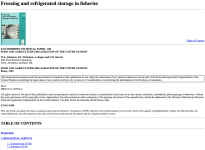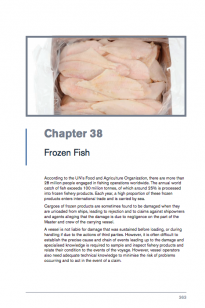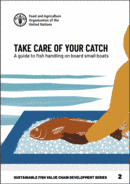Freezer Vessels
In practice, the time restriction for storage in ice often means that fishing vessels must return to their home port with the fish room partly empty. There is therefore a need for some means of preservation that will extend the storage life without substantially altering the nature of the raw material. Quick freezing and cold storage is an excellent way of doing this. When newly caught, fish are frozen quickly and stored at a low temperature on board, so there is no limit imposed on the length of voyage due to spoilage of the catch. Fishing vessels can remain at the fishing grounds until the hold is full. This increases the proportion of time spent at the fishing ground and improves the economics of fishing. It also allows the fish to be distributed to a wider market even without the existence of an elaborate "cold chain."
Fish which have been frozen at sea are of very good quality when landed; therefore, more time is available for the fish to be distributed over a wider area and still be in good condition. Freezing at sea has therefore an important role in world fisheries. A look at a map will show that large areas of ocean are far distant from any centres of population or even land, and many potential fisheries are therefore unexploitable without a method of preserving the fish for long sea voyages. Only quick freezing and low temperature storage has so far satisfied this need and, as traditional near water fisheries become overfished or are unable to satisfy the growing demands of an ever increasing population, freezing at sea will become more and more necessary. Sea-frozen fish, properly handled between landing on deck and loading into the freezer, when thawed are almost undistinguishable, from fresh fish kept in ice for a few days. The loss in quality as a result of freezing, cold storage and thawing is small when these treatments are properly applied. Thus, when very fresh fish are frozen at sea, the final product can be equal to the best on the market.
Food loss and waste (FLW) is associated with loss of quality. This may be seen in the frozen product, (e.g. freezer burn, discoloration, mechanical damage), but in many cases the loss of quality is not noticeable until after thawing and cooking. Most of the mechanisms of quality loss are determined by storage temperature and are accelerated with time spent above the recommended value. Other factors that can lead to FLW include:
- Processing of poor-quality raw material
- Slow freezing process leading to Oswald ripening
- Wrong storage temperature
- Temperature fluctuations
- Unfrozen water
- Vapour migration
- Exposure of frozen product to air
- Solute concentration and osmotic dehydration
- Accretion
Advantages and Disadvantages of Freezing
Advantages and Disadvantages of Freezing
Advantages of freezing include:
- flesh is changed very little and there is minimal loss of quality
- fish can be stored for many months - for times when catches are scarce
- large quantities of fish can be stored
- good quality fish can be transported over long distances (e.g. export to areas where fresh fish are unavailable; fish caught in remote waters can be consumed at home)
Disadvantages of freezing include:
- quality changes can occur if fish is not stored properly
- can be expensive due to the power or fuel needed to operate the freezer
- customers often have less regard for frozen fish, so there is less oyster meat to be kept for a long time. demand
- until it has thawed, it may be difficult to identify whether the fish has been abused
Key Publications
Freezing and refrigerated storage in fisheries This FAO publication provides an introduction to the operations and equipment used in fish freezing and cold storage on shore and sea, and gives information on applying low temperatures to reduce deterioration of quality. | |
|
Guide for vessel operators to assist minimise the risk of problems associated with the transport of frozen fish products. | |
International Institute of Refrigeration (IIR) The IIR is the only independent intergovernmental science and technology based organization that promotes knowledge of refrigeration fields. Key issues addressed include food safety, health, energy saving and efficiency, global warming and ozone depletion. |
More Resources
More Resources
31 October 2023














